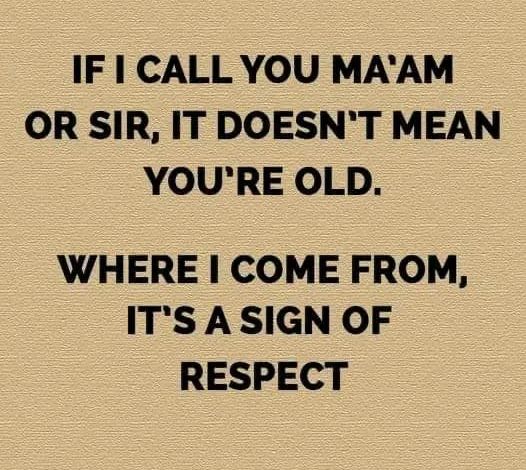
ADVERTISEMENT
The Enduring Value of “Ma’am” and “Sir”: A Reflection on Respect and Tradition
In many parts of the world, particularly within certain regions of the United States and in various other countries, addressing someone as “ma’am” or “sir” is more than a mere formality—it is a profound expression of respect. This practice, rooted deeply in cultural traditions, serves as a reminder of the timeless values of courtesy and regard that transcend generational boundaries.
Understanding the Context
The use of “ma’am” and “sir” can be traced back to formal English, where these terms were traditionally part of a polite and respectful mode of address. Over time, these terms have been woven into the social fabric of various cultures, each adapting them to its unique context.
Cultural Significance
In places like the southern United States, the use of “ma’am” and “sir” is widespread and taught from a young age. Here, these terms are used irrespective of a person’s age and are not intended to suggest that someone is old. Instead, they are seen as a sign of good upbringing and respect for the person being addressed.
Global Perspectives
The interpretation of these terms varies globally. For example, in some Asian cultures, honorific titles and specific phrases are used to convey respect, especially towards elders and in formal settings. Similarly, European interactions might lean on linguistic cues that denote formality and respect, though the specific words like “ma’am” and “sir” may be used less frequently.
Contemporary Usage and Misinterpretations
While many continue to see the value in these traditional forms of address, there is a range of perspectives on their appropriateness in contemporary society. Some may feel that these terms are outdated or carry implications about age that they find uncomfortable. However, understanding the intent behind the words—as signs of respect—can help bridge the gap between traditional practices and modern sensibilities.
ADVERTISEMENT
The Role of Language in Respect
Language is a powerful tool for conveying respect. Whether it’s through using titles like “ma’am” and “sir,” employing appropriate honorifics, or simply the way we use words, language shapes our interactions and can reflect our respect for others. It’s important to be mindful of how language and cultural practices are perceived and understood in diverse contexts.
Conclusion
“Ma’am” and “sir” are more than just polite additions to our language—they are carriers of tradition and respect. As society evolves, so does the language we use to interact with each other. By embracing the spirit of respect inherent in these terms, we can appreciate their use as a bridge between traditional courtesy and modern interaction. In recognizing the intent behind the words, we continue to foster a culture of respect and civility.
This article aims to explore the nuanced role of respectful terms of address and their importance in maintaining the fabric of social courtesy. If there’s more you’d like to delve into on this topic or related areas, feel free to let me know!
ADVERTISEMENT




